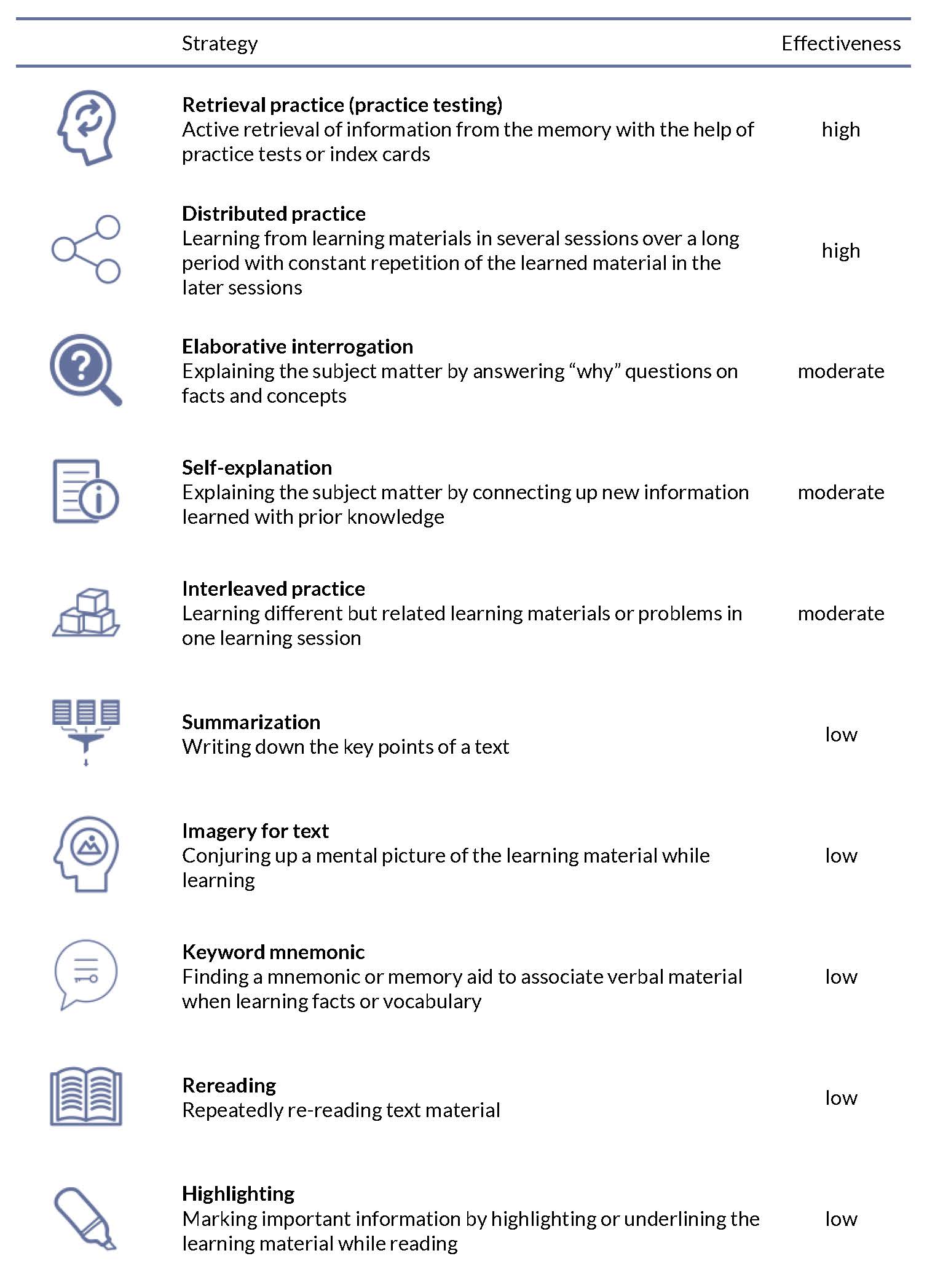Marking key terms, summarising the gist of the learning material, learning text passages off by heart – these learning strategies (and others) are often applied by students to deal with the subject matter. But are these particular strategies actually effective and do they help with long-term learning success? And how can effective strategies be fostered?
The use of effective strategies is critical for academic learning success (Biwer, oude Egbrink, Aalten & de Bruin, 2020). What makes learning strategies effective is if they have the potential to improve learning long-term and in different contexts. In one review, Dunlosky et al. (2013) studied 10 learning strategies frequently used by students and categorised them according to their effectiveness. The following table summarises the results in an overview.

Effective learning strategies
Learning strategies such as retrieval practice or distributed learning seem to be the most effective when it comes to long-term learning. With retrieval practice, such as using old exams or quiz questions for practice, students have to retrieve and apply knowledge actively, which makes it easier to store in the long-term memory (Biwer, et al., 2020).
The strategy of distributed practice is more about setting up a plan for learning than about a certain way of learning. Learning is distributed over a period of time and the subject matter is repeated at different times during the learning process.
Strategies with moderate effect
Elaboration strategies like elaborative interrogation and self-explanation likewise require the subject matter to be processed actively. With elaborative interrogation, the students ask themselves detailed questions and answer questions about the “why”. With the strategy of self-explanation, students explain the subject matter themselves and try to connect it to knowledge they already have (Biwer, et al., 2020). The strategy of distributed practice refers to the transition between different topics in a single learning session.
These effective strategies have one thing in common: they require commitment and the willingness to put in some effort. Students are unaware of some of these strategies or do not want to apply them (Biwer, et al., 2020).
Strategies with low effect
Strategies like highlighting organise the content of the knowledge rather than requiring new knowledge to be processed directly. Organising the new information is the first step towards finding a way into the new learning content.
There is still a lack of active examination and embedding of new information in existing knowledge structures. If this does not happen, knowledge will not be processed adequately and the learning progress will only be moderate. However, students still have the feeling that they have done something and “learned” something. The result is often overconfidence and overestimation of their own level of competence, which can have a negative effect on their learning success. If the application of learning strategies like this leads to performance results that are positive but only short-lived, students can easily be deceived and regard these strategies as supposedly effective. That is a problem when it comes to successful, long-term learning (Biwer, et al., 2020).
Biwer et al.(2020) therefore call for students to be made aware of effective learning strategies that facilitate long-term learning and retention. Furthermore, students should be confronted with their overestimation of their level of competence after they apply “simple” but ineffective learning strategies. This can be achieved by imparting knowledge about learning strategies. Students need to know which learning strategies they can specifically use in self-study and when, and then actually apply these strategies as well.
Study Smart
Biwer et al. (2020) therefore developed the Study Smart intervention programme, which pursues the following goals:
- making students aware of effective learning strategies
- facilitating reflection on such strategies and
- fostering the application of those strategies.
Intervention process
The intervention programme consists of three two-hour sessions on the topics of awareness of, reflection on and practice of effective learning strategies. Graphic 1 below shows the time schedule.

The intervention programme is designed for students and takes place over a period of six weeks. Content sessions are held every two weeks.
Awareness of effective learning strategies
In the first session, the students are first made aware of the effectiveness of different strategies. Ten learning strategies and their application are demonstrated. After that, the students rank their effectiveness and say whether they have used these strategies themselves and when. The moderators then define how time-consuming it is to apply a strategy and how it can be used. In addition, the students are advised of the importance of regular practice, of making the necessary commitment and of investing time in learning. In a written reflection task, the students are to recognise the difference between what feels like learning progress (overestimating their own abilities) and what is actually learning and increased competence. The moderators subsequently instruct the students to connect this experience with the challenge of applying effective learning strategies. The session ends with a task in which the students answer questions on which learning strategy makes sense, when it makes sense, and why. The answers are subsequently discussed in the group. The intention behind this is for the content of the session to be repeated and internalised. For homework the students keep a learning journal on their learning behaviour until the next session, thereby reflecting on their own learning strategies.
Reflection on effective learning strategies
In the second session, the effectiveness of learning strategies is reflected on in more detail and the students’ motivation to learn is integrated. At the beginning of the session, the students present their learning journals and the learning strategies they have used in the past weeks. They subsequently fill in questionnaires on their learning strategies and their academic goal orientation. This is to encourage the students to consider what goals they want to achieve with regard to their studies. The students evaluate their questionnaires themselves and talk to their fellow students about their motivation to learn. To finish, the students formulate their intention regarding how and when they want to implement effective learning strategies in their independent study.
Practice of effective learning strategies
In the third – and final – session, students are now to apply effective learning strategies and thereby experience the difference between effective and ineffective learning strategies themselves. In two groups, the students apply ineffective strategies once (highlighting) and effective strategies once (retrieval practice), using scientific articles as a basis. This is followed by a short test in which questions on the articles have to be answered. The students assess their performance with the help of the answer sheet. The goal of the exercise is for them to experience the differences in commitment and willingness to put in effort when applying effective learning strategies themselves. At the end, the students receive an infographic summarising the effectiveness of the different learning strategies.
In the article entitled “Fostering effective learning strategies” by Biwer and colleagues (2020) you will find a detailed description of the intervention programme and materials for carrying it out.

Results of initial analyses
In their first analysis, Biwer und et al. (2020) analysed the Study Smart intervention programme by means of questionnaires and qualitative interviews. The initial results show that students who participated in the programme obtain specific knowledge concerning which learning strategy is suitable for them to use with which learning material.
However, the prerequisite for effective strategies actually being applied is that students are given suitable tasks in both the teaching and exam situations which foster the application of effective strategies.
Conclusion for teaching
The findings from the Study Smart intervention can be used in practical teaching in a number of ways:
- Lecturers should lay a stronger focus on the application of effective learning strategies in their own lectures and seminars. They can do that by setting corresponding learning tasks that prompt students to demonstrate a specific learning behaviour and thus apply effective learning strategies.
- In terms of the distributed practice strategy, knowledge should be repeated at longer and longer intervals with the use of small tests or tasks.
- By being provided with self-tests like quizzes with open-ended questions, students can assess their current level of competence accurately and repeatedly check the quality of their learning.
- During feedback sessions, lecturers and students should reflect as a group on how the learning material was dealt with and discuss effective learning strategies with regard to long-term learning.
- Exams should also be designed with the application of effective learning strategies in mind. By the exams involving the solution of practically orientated problems and tasks, students are forced to prepare for the exam accordingly by using effective learning strategies like retrieval practice (Constructive Alignment, Biggs & Tang, 2011).
- The intervention programme can be particularly suitable for developing effective learning strategies for freshers. Students embarking on their studies for the first time can be sensitised to the effectiveness of learning strategies right from the start and find out how to apply these in their independent study.
References
Biggs, J. & Tang, C. (2011). Teaching for quality learning at university. What the student does (4th ed.). Maidenhead: Society for Research into Higher Education and Open University Press.
Biwer, F., oude Egbrink, M. G. A., Aalten, P., & de Bruin, A. B. H. (2020). Fostering Effective Learning Strategies in Higher Education – A Mixed-Methods Study. Journal of Applied Research in Memory and Cognition, 9(2), 186-203. https://doi.org/10.1016/j.jarmac.2020.03.004
Dunlosky, J., Rawson, K. A., Marsh, E. J., Nathan, M. J., & Willingham, D. T. (2013). Improving students’ learning with effective learning techniques: Promising directions from cognitive and educational psychology. Psychological Science in the Public Interest, 14(1), 4-58. https://doi.org/10.1177/1529100612453266
Suggestion for citation of this blog post
Rottmeier, S. (2024, March 14). Effective learning strategies – and how they can be fostered. Lehrblick – ZHW Uni Regensburg. https://doi.org/10.5283/ZHW.20240314.EN

Stephanie Rottmeier
- Stephanie Rottmeier
- Stephanie Rottmeier
- Stephanie Rottmeier
- Stephanie Rottmeier





